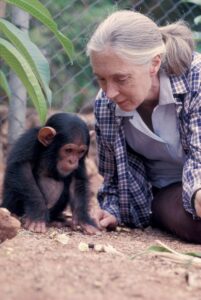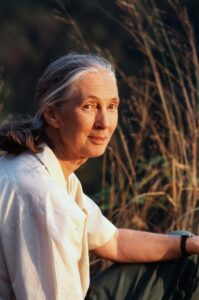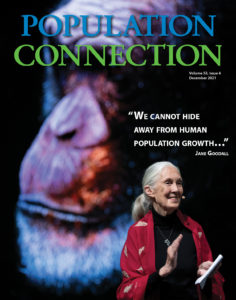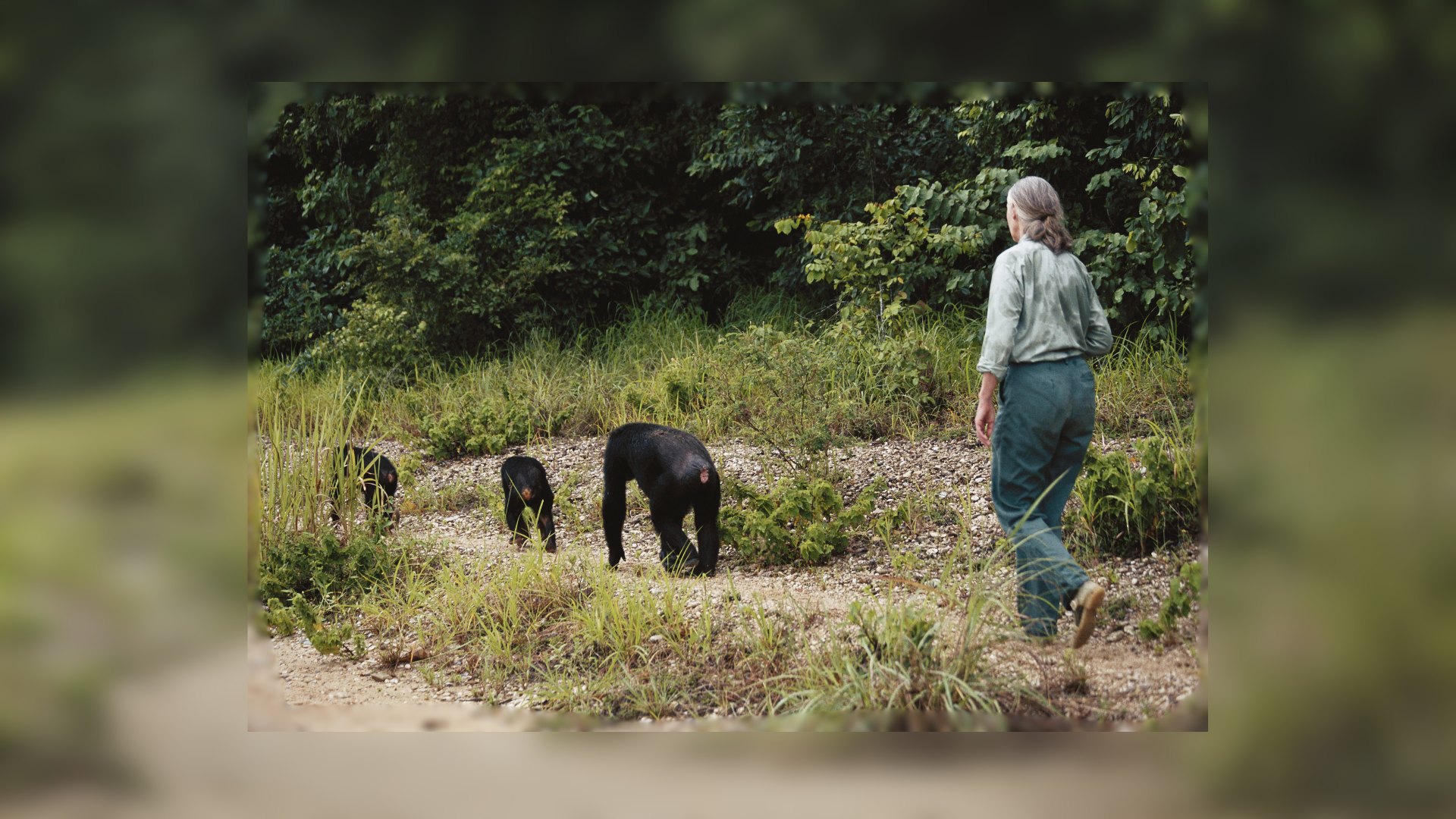The power of empathy, hope, and tireless activism: A reflection on Dr. Jane Goodall’s legacy
Written by Olivia Nater | Published: October 3, 2025
Our team at Population Connection is deeply saddened by the passing of the legendary ethologist and conservationist Dr. Jane Goodall. Through her decades-long field research on chimpanzees in Gombe National Park, Tanzania, she brought to light key behavioral insights that changed the way the world perceives animals. A trailblazer, Dr. Goodall was one of the first female field researchers, defying adversity in a field that was heavily male-dominated at the time. Through her work with her non-profit, the Jane Goodall Institute, Dr. Goodall went on to become one of the most tireless and inspirational messengers for environmental protection, empathy, and hope of our time.
Defying anthropocentrism: Jane Goodall’s groundbreaking research

I was one of the many young girls who idolized Dr. Goodall. Like her, I’ve been passionate about animals from a very young age. Her stated childhood dream of “going to Africa, living with animals, and writing books about them,” was very relatable. The way she spoke about animals and the natural world always appealed to me. I thought of her as one of the few wise people who had cast aside the anthropocentric lens of human superiority and who truly recognized animals for who they are.
I love her statement that her greatest teacher was her childhood dog, Rusty (fun fact: dogs, not chimps, were her favorite animal – the latter being too much like people). In the 1960s, the early days of her research, Dr. Goodall received criticism from fellow scientists for giving names to her study chimpanzees, and talking about them as sentient individuals rather than numbered specimens. Instead of confronting her critics, she “just quietly went on doing” what she “knew was right.”
While studying for my undergraduate degree in zoology in the early 2000s, I too was warned not to “anthropomorphize” animals (ascribe human-like emotions and feelings to them) because it is considered “unscientific.” However, I have always believed that one of the root problems regarding our relationship with the natural world is that we don’t “anthropomorphize” enough.
Jane Goodall’s research and unwavering conviction that we are a part of the animal kingdom, and not separate from it, lay the crucial groundwork for a healthier, more compassionate world. Time and again, research into animal behavior has proven that countless species are capable of perceiving the same pain, suffering, joy, jealousy, etc., that we humans experience. Animals are far more complex and intelligent than we give them credit for.
Here’s a lovely clip of Dr. Goodall reflecting on animal personalities:
In 1960, Dr. Goodall documented chimps modifying and using sticks to “fish” for termites, making her the first scientist to prove that humans were not the only beings capable of creating and using tools. Until then, tool use had been thought of as a defining feature of humankind. In response to this groundbreaking discovery, Jane Goodall’s mentor, famous paleontologist and anthropologist Dr. Louis Leakey, quipped, “Now we must redefine ‘tool,’ redefine ‘man,’ or accept chimpanzees as humans.”
Dr. Goodall made many fascinating discoveries during her time living among chimps, some heart-warming, some terrifying (such as their warfare and cannibalistic tendencies), all of them reflecting the uncomfortable truth that Homo sapiens’ closest living relative is a lot more like us than we imagined. Dr. Goodall noted that there is much we can learn from chimps. One thing they seem better at than us, for example, is their ability for reconciliation after conflict:
A voice of reason, a beacon of hope and empathy: Jane Goodall’s activism
Witnessing first-hand the alarming impact of rapid deforestation on chimpanzee habitat, Dr. Goodall became concerned about the state of the environment early on and established the conservation organization the Jane Goodall Institute in 1977.
A true champion for the progressive population movement, Dr. Goodall never shied away from addressing the issue of human population growth. In this 2019 statement for UK-based population organization Population Matters (for which she was a patron), she denounces the absurd notion of infinite growth on a finite planet, and highlights the critical role of women’s empowerment in protecting the environment:
Despite facing intense criticism for addressing the population factor, Jane Goodall didn’t waver in her advocacy for empowering, ethical population action. For example, here she is discussing the role of population stabilization via girls’ education in fighting climate change at a 2017 event, and here is a snippet of her telling world leaders at the 2020 World Economic Forum in Davos that “we cannot hide away from human population growth, because it underlies so many of the other problems.”

Dr. Goodall became dedicated to raising awareness of environmental issues in her later years, annually spending as many as 300 days traveling for speaking engagements. The fact that she died (apparently peacefully, in her sleep) during a speaking tour in California demonstrates her tireless commitment to environmental advocacy.
She was a particularly powerful messenger for empathy and compassion, including towards non-human animals. For example, she frequently spoke about the cruelty of factory farming, explaining how she first turned vegetarian and then vegan after learning how farmed animals are treated.
Jane Goodall was perhaps most cherished for her relentless optimism and promotion of hope despite the severity of our environmental crises. She believed that “doom and gloom” messaging fostered apathy, and told the world, “What you do makes a difference, and you have to decide what kind of difference you want to make.” Dr. Goodall was passionate about working with young people, citing them as her greatest reason for hope. The Jane Goodall Institute’s Roots & Shoots youth program has mobilized almost two million young people around the world to engage in conservation actions.
An unforgettable legacy
Dr. Goodall rightly received many prestigious awards and honors throughout her lifetime. For example, she was named a United Nations Messenger of Peace in 2002, was appointed Dame of the British Empire in 2004 (yet always preferred to go by “Dr. Goodall”), and was granted the US Presidential Medal of Freedom by Joe Biden in January 2025. Let’s also not forget that she was probably the only person in history to be fluent in chimpanzee. As we wrap up this tribute to the wonderful Dr. Goodall, please enjoy this clip of her pant-hooting “good morning:”
During a time when the world seems to be moving backwards in so many ways, with powerful far-right extremists fostering division and hate over kindness and empathy, we would do well to hold on to Dr. Goodall’s teachings. As she leaves our world behind and embarks on her “next great adventure” (her admirably fearless interpretation of death), let’s vow to carry her powerful legacy into the future, and try to mirror her persistence and determination in our efforts to steer humanity onto a better path.
 Read our special magazine edition on Jane Goodall from December 2021!
Read our special magazine edition on Jane Goodall from December 2021!

